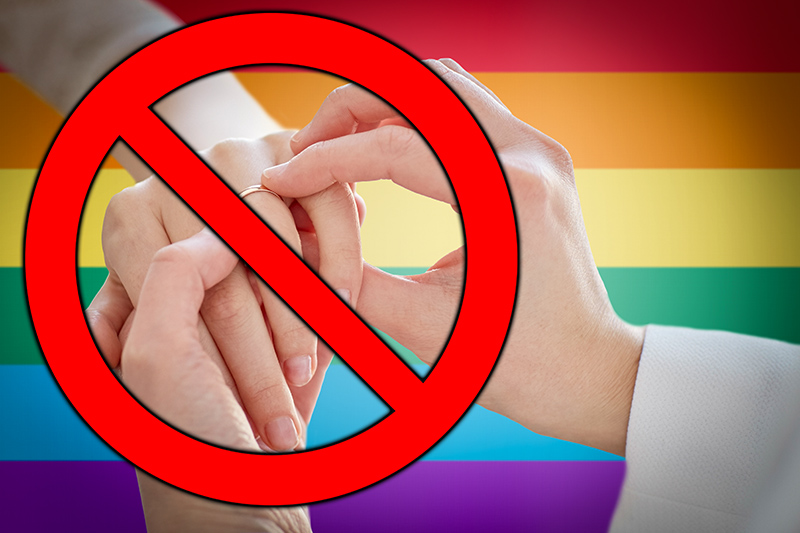Montana governor signs bill requiring surgery before trans people can amend birth certificates
Law would require proof of gender confirmation surgery before changing the gender marker on a person's birth certificate.

Montana Gov. Greg Gianforte (R) has signed a bill restricting transgender people from changing the gender on their birth certificates unless they obtain gender confirmation surgery.
Under the state’s previous policy, transgender people could update their certificates with the corrected name and gender marker by providing a copy of a photo ID reflecting their name and gender identity, a signed statement attesting to their gender identity, or a court order indicating that they had undergone a gender transition.
The new policy, signed by Gianforte, makes it nearly impossible for transgender Montanans to change the gender marker on their birth certificates, as many transgender people do not seek out surgery, may not require it to treat their gender dysphoria, or may be prevented from accessing it because of associated costs when surgery is not covered by insurance.
Sen. Carl Glimm (R-Columbia Falls), the sponsor of the bill, claimed that the state’s health department, under former Gov. Steve Bullock (D), had overstepped its authority by allowing people to change their gender marker in a way that does not match their assigned sex at birth.
He also argued that birth certificates contain important vital statistics, and therefore should not be changed.
“I think birth certificates are an item of fact,” Glimm said during the floor debate over the bill in March, according to the Montana Free Press. “When a person is born, you record where they’re born, you record their weight, you record their sex. And that’s important information to document.”
See also: Supreme Court allows same-sex parents to be listed on Indiana birth certificates
The new law does not change the current policy regarding driver’s license changes — although lawmakers could choose to target or rescind that policy at a later date.
In order to update a name or gender marker on a Montana state ID, an applicant must submit a certified copy of court order granting the name change, as well as a letter from a doctor stating that the person is in the process of undergoing or has undergone a gender transition.
A similar law barring transgender people from amending the gender marker on their birth certificate in any circumstance was signed into law by Idaho Gov. Brad Little (R) last year.
The American Civil Liberties Union filed a lawsuit challenging the law, and a federal judge ultimately struck down the law last August.
In December, another federal judge struck down an Ohio law that categorically prohibits people from amending the gender marker on their birth certificates.
Gianforte recently signed a “religious freedom” bill into law that critics claim could lead people to use their religious beliefs to justify instances of discrimination, such as denying services to LGBTQ people.
Lawmakers have also passed a bill barring transgender athletes from competing on sports teams that match their gender identity, but Gianforte has not said whether he intends to sign it into law.
Critics are wary of that bill, warning that its passage could lead the NCAA to yank sporting events from the state, and could also prompt the business community to scuttle plans to relocate to or expand operations in Montana.
“The birth certificate bill is simply another targeted attack against transgender Montanans, and like all of the other attacks on trans Montanans, it’s unconstitutional, and we expect to see the state in court,” Alex Rate, the legal director of the American Civil Liberties Union of Montana, told Metro Weekly in an interview.
“For many transgender people, surgery is not necessary in order to confirm their gender identity or to transition. For many transgender people, surgery is simply financially not an option. And so placing an arbitrary barrier, such as surgery, between an individual and a government document that identifies the appropriate gender is unnecessary,” Rate said. “And the state continues to try to insert itself between individuals and forms of identification, individuals and their health care providers, with absolutely no justification.”
Read more:
No, ‘Luca’ isn’t Pixar’s ‘Call Me By Your Name,’ director confirms
Homophobe punches man in head during anti-gay attack in New York
Two-thirds of gay, bisexual Gen Z boys are out to their parents, study finds
Support Metro Weekly’s Journalism
These are challenging times for news organizations. And yet it’s crucial we stay active and provide vital resources and information to both our local readers and the world. So won’t you please take a moment and consider supporting Metro Weekly with a membership? For as little as $5 a month, you can help ensure Metro Weekly magazine and MetroWeekly.com remain free, viable resources as we provide the best, most diverse, culturally-resonant LGBTQ coverage in both the D.C. region and around the world. Memberships come with exclusive perks and discounts, your own personal digital delivery of each week’s magazine (and an archive), access to our Member's Lounge when it launches this fall, and exclusive members-only items like Metro Weekly Membership Mugs and Tote Bags! Check out all our membership levels here and please join us today!

























You must be logged in to post a comment.